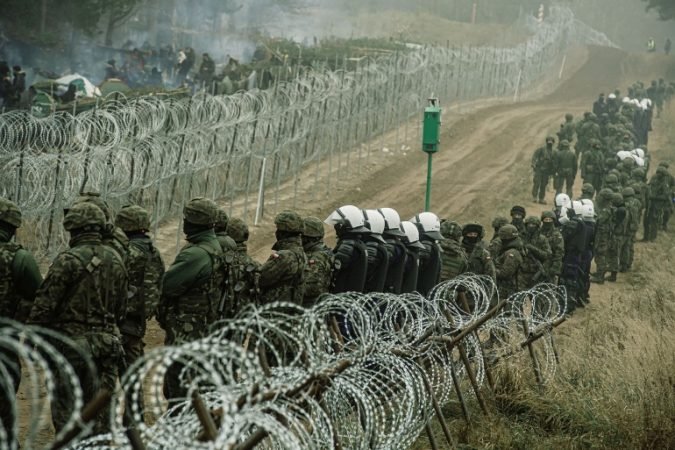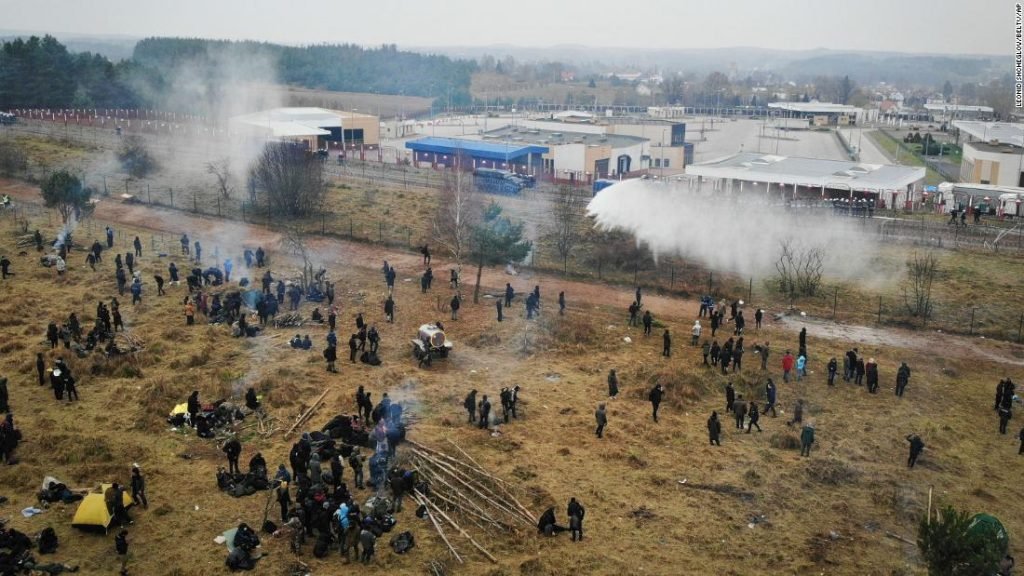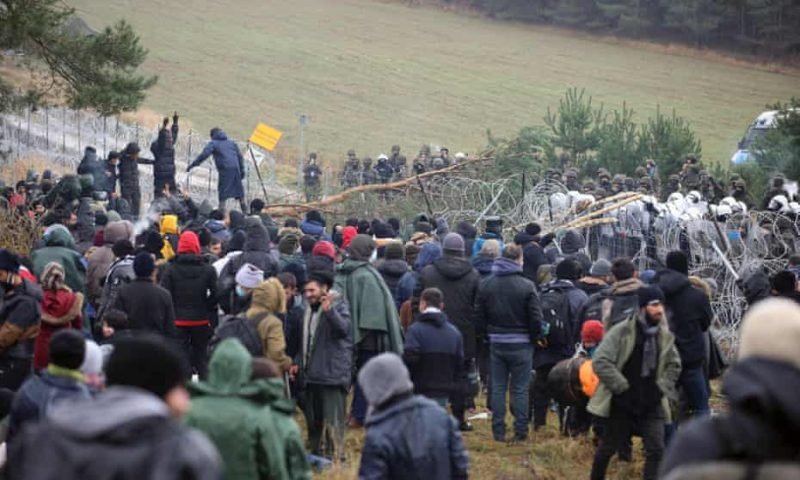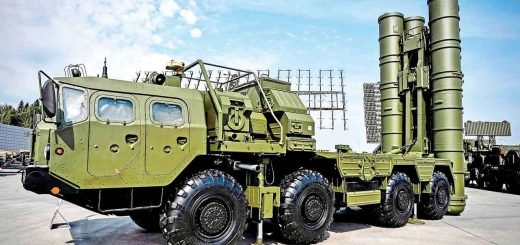Here’s what you need to know about Poland-Belarus border tensions

Thousands of people are stranded at the border between Poland and Belarus in terrible conditions, trapped at the center of an intensifying geopolitical dispute.
The migrants — most of whom are from the Middle East and Asia, and who are hoping to travel on from Poland deeper into Europe — have been gathering on the Belarusian side of the Kuznica border crossing. Authorities closed the crossing last week, with aerial footage showing large crowds congregating in the area.
Here’s what you need to know about the crisis that’s unfolding on Europe’s frontier.
Migrants are facing dire conditions
Charities say people stuck in the border area are battling freezing weather and lack food and medical attention, with reports of beatings and grueling conditions continuing to emerge.
Polish police said Monday that around 3,500 people had gathered near the Kuznica crossing. On Friday, Belarusian border officials told CNN that 200 children and 600 women were among an estimated 2,000 people massed near the border crossing. Some of those are only babies or toddlers.
One Syrian asylum-seeker, who recently arrived in Poland after his third attempt at crossing the border from Belarus, told CNN that on arriving at the border, guards caught him and three others in his group. He was beaten up, and suffered facial injuries, a broken nose and bruised ribs.
Polish authorities said seven migrants have been found dead on Poland’s side of the border, with reports of more deaths in Belarus.
Since the beginning of November, there have been thousands of recorded border crossing attempts, according to Polish authorities.
A spokesperson for Poland’s border guards told CNN on Monday that there had been “forced mass attempts to cross the border” in Kuznica area by a group of people over the weekend and that the situation was “very tense and very dangerous.”
Last week, Polish border guard representatives told CNN that some of the migrants had been pushed toward the barriers by Belarusian services.
Speaking on Monday, Belarusian President Alexander Lukashenko said Belarus was doing everything to prevent people from accumulating at the border.
Polish authorities have detained small numbers of people, allowing only small numbers of people the option of applying for asylum in Poland. Others have been immediately sent back to Belarus.
Access to the border area is tightly restricted. Journalists and aid workers have been blocked from traveling to the area by an exclusion zone.

Poland’s government is ramping up its nationalist rhetoric
Polish President Andrzej Duda visited the border last Thursday in a show of solidarity with the military, police and border guards. Earlier in the day, Duda addressed thousands of Poles who marched through Warsaw to celebrate Independence Day.
In a speech with nationalistic references in support of the government’s strict policy of keeping the border with Belarus closed to migrants, he said: “We have always been, we are and we will be part of a Europe based on Christian values, which are also the foundations of our tradition and culture.”
“The time has come when you need to defend your homeland. But we need to guard its borders more than before,” Duda said, adding: “It must be done with dedication, with sleepless nights, in coldness, in hardship, in a very ungrateful situation to which we were forced by the hybrid actions of the Belarusian regime against Poland and against the European Union.”
Humanitarian groups are accusing Poland’s ruling party of violating the international right to asylum by pushing people back into Belarus instead of accepting their applications for protection. Under article 14 of the Universal Declaration of Human Rights, everyone has the right to seek and enjoy asylum from persecution in other countries. Poland says its actions are legal.
A larger political crisis is brewing
Lukashenko has been accused of manufacturing the migrant crisis on the border by the prime ministers of neighboring Poland, Latvia and Lithuania, leading Poland to adopt a bill in October for the construction of a wall along its border with Belarus.
NATO’s Secretary General Jens Stoltenberg also pointed the finger at Belarus, saying last week that “Belarus using migrants as a hybrid tactic is unacceptable.”
Lukashenko’s government has repeatedly denied such claims, instead blaming the West for the crossings and treatment of migrants.
Russia, Belarus’ largest (and most important) political and economic partner, has defended Minsk’s handling of the issue and has denied any involvement in the crisis.
Russian President Vladimir Putin said on Saturday that Russia had “absolutely nothing to do with” the ongoing crisis at the border.
Russia underlined its support for the Lukashenko regime by performing joint military exercises over Belarusian airspace last week.
On Wednesday, two long-range Russian Tupolev Tu-22M3 supersonic long-range bombers practiced “issues of interaction with ground control points” with armed forces of both countries, the Russian Ministry of Defense said. On Thursday, they carried out those flights over Belarus’ airspace for a second time.

The two nations then held joint paratrooper drills near the Polish border on Friday.
Meanwhile, Ukraine is also scaling up security around the border with Belarus. On Thursday, it announced it would hold military drills with some 8,500 servicemen and 15 helicopters in an area near its borders with Poland and Belarus to counter a potential migrant crisis.
Speaking to “Axios on HBO” last week, Stoltenberg said the alliance was closely monitoring “unusual” Russian troop movements near the Ukraine border and would be ready to address what may happen.
Following talks in Brussels with Ukraine’s foreign minister, Stoltenberg said on Monday: “We again call on Russia to de-escalate, to reduce tensions and be transparent on their military activities in and around Ukraine.” Stoltenberg has promised NATO’s “support” to Ukraine, which is not a NATO member.
The crisis at the Poland-Belarus border is continuing to test a fragile political order, with allegations from the United States on Russia’s military buildup deepening concerns over the potential for a wider geopolitical crisis.
US Secretary of State Antony Blinken said last Wednesday that the US was “concerned by reports of unusual Russian military activity” and mentioned the possibility that Russia may be “attempting to rehash” its 2014 invasion of Ukraine.
Last Friday, Russia said any allegations that it could invade Ukraine were “empty, groundless escalation of tensions.”
Belarus faces new sanctions
European leaders have accused Belarus of manufacturing the migrant crisis on the EU border as retribution for sanctions over human rights abuses, a claim the Belarus government has repeatedly denied.
In response to the escalation, the United States and the European Union announced new sanctions against Belarus last week. On Monday, the EU’s foreign policy chief Josep Borrell said the bloc was going to extend sanctions further.
“Today we are going to approve a new package of sanctions against Belarusian people responsible for what’s happening … and we are going to launch a framework in order to implement other sanctions to other people, airlines, travel agencies and everybody involved on this illegal push of migrants in our borders,” he said.
The White House’s National Security Council said last week the US was preparing “follow-up sanctions” designed to hold Belarusian leaders accountable for “ongoing attacks on democracy, human rights and international norms.” The spokesperson did not specify when the new sanctions would come into place.
“We are deeply concerned by the Lukashenka regime’s inhumane actions and strongly condemn their callous exploitation and coercion of vulnerable people,” the spokesperson said.
This is the second round of sanctions announced by the US in recent months. In August, the White House announced a sweeping executive order targeting those in the Belarusian regime involved in the repression of human rights and democracy.
The executive order was released on the one-year anniversary of Belarus’ election, which sparked widespread protests throughout the country and which the US — and much of the international community — declared fraudulent.


















